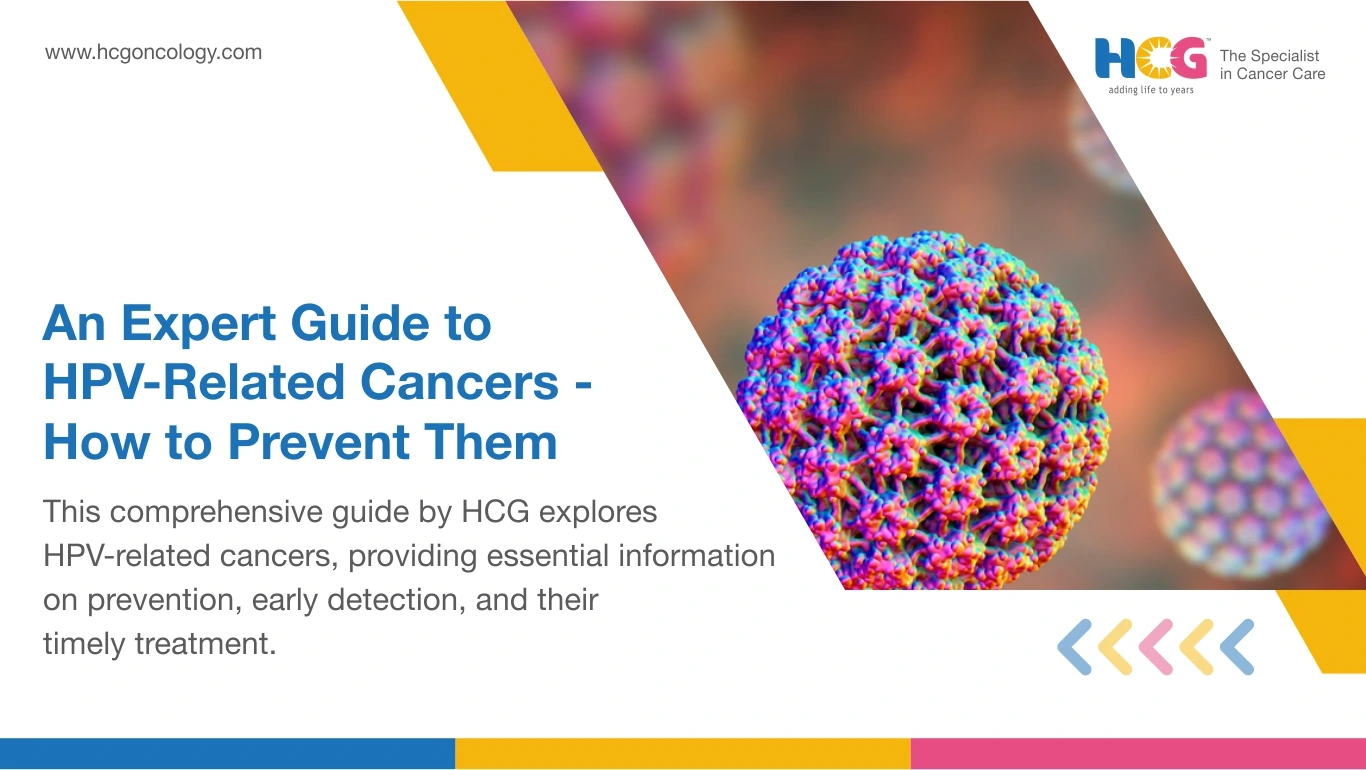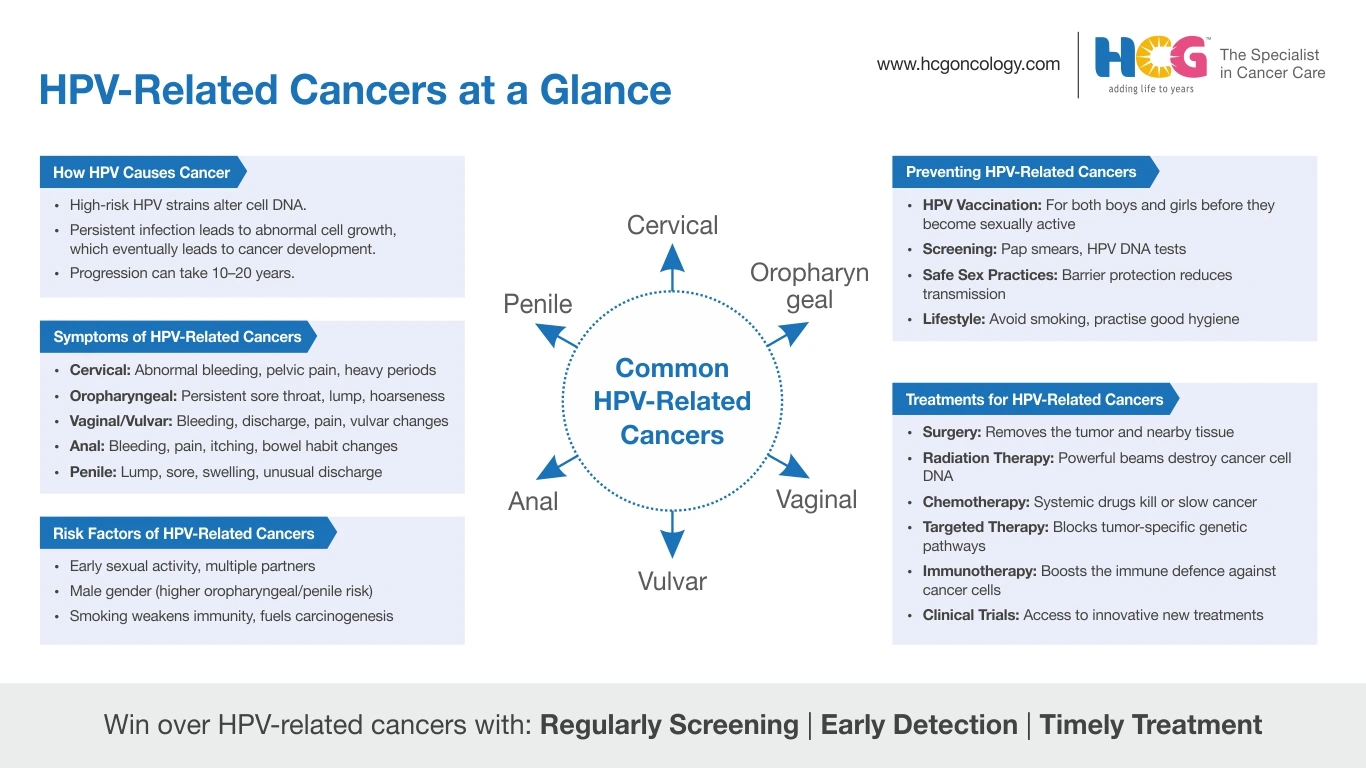
13 Nov, 2025
Feel free to reach out to us.

13 Nov, 2025

This article is medically reviewed by Dr. Abhilasha Narayan, Senior Consultant - Gynecological Oncology, HCG Cancer Centre, K. R. Road, Bangalore.
The human papillomavirus (HPV) is a widely known group of viruses and is transmitted through skin-to-skin contact during sexual intercourse or other sexual activities.
In most cases, HPV infections resolve spontaneously. However, in a small percentage of cases, infections can become persistent, leading to precancerous changes, which can result in HPV-related cancers or HPV-positive cancers.
Different HPV-related cancers include cervical cancer, oropharyngeal cancer, vaginal cancer, vulvar cancer, penile cancer, and anal cancer.
It is crucial to know why cancer occurs, its signs and symptoms, how it can be avoided, and the various ways of treating it, now that people are more enlightened and there are improved facilities such as specialized cancer hospitals in Bangalore.
Human papillomavirus (HPV) is a sexually transmitted virus that affects both males and females. Although there are more than 100 different kinds of HPV, approximately 14 of these types are highly oncogenic. It infects epithelial cells and, at times, leads to cancer if infection persists for a long period of time.
Both men and women can be diagnosed with different types of cancer, which are associated with high-risk HPV.
The following are the different types of HPV-related or HPV-positive cancers:
HPV-related cancers usually take years to progress from a precancerous condition to cancer. Regular screening and paying attention to symptoms can help in early detection of cancer, sometimes even in a precancerous state, and timely treatment.

Globocan 2022 reports for India state that cervical cancer is the third most common cancer and the second most common among women in India, with approximately 1,27,526 new cases recorded every year.
There is also a rise in HPV-positive oropharyngeal cancers, particularly among the young.
A large percentage of HPV-related cancers can be prevented through vaccination and regular screening.
High-risk human papillomavirus strains, such as HPV 16 and HPV 18, are associated with cancer development. In most cases, these infections wear off by themselves. However, in some cases, these infections can become persistent, cause mutations in the DNA structure, trigger abnormal cell division, and eventually lead to cancer.
Common risk factors for HPV-related cancers include:
Having these risk factors does not guarantee a diagnosis; however, they can increase one’s chances of developing HPV-related cancers.
When the DNA of high-risk HPV types is integrated into human cells, it disrupts normal cellular function. As a result, there is uncontrolled cell growth, which may culminate in cancer. It usually takes between 10 and 20 years for the infection to develop into cancer.
The key risk factors or possible causes of HPV-related cancers include:
The symptoms of HPV-related cancers vary with the specific type, but they commonly involve things like unusual bleeding, persistent sore throat, and growths that can be seen. Early recognition of these symptoms is vital for early detection of HPV-related cancers and improving treatment outcomes.
| Type of HPV-related Cancer | Symptoms |
|---|---|
| Cervical Cancer | Abnormal vaginal bleeding, unusual vaginal discharge, pelvic pain, heavier menstrual periods, etc. |
| Oropharyngeal Cancer | Presence of a lump in the neck, persistent sore throat, hoarse voice, difficulty swallowing, ear pain, and more. |
| Vaginal Cancer | Abnormal vaginal bleeding, persistent vaginal discharge, pain during intercourse, pelvic pain, and a mass in the vagina. |
| Vulvar Cancer | Burning sensation on the vulva, changes in the appearance of the vulva, pain in the vulvar region, and bleeding unrelated to menstruation. |
| Anal Cancer | Bleeding from the anus, pain in the anal region, itching or irritation in the anal region, presence of a lump in the anal region, changes in bowel habits, etc. |
| Penile Cancer | Presence of a lump or sore on the penis, changes in the appearance and texture of the penile skin, swelling, bleeding, unusual discharge, and more. |
HPV-related cancers can be asymptomatic (without any symptoms) in early stages; therefore, regular medical checkups are crucial. Women should undergo routine Pap smear tests, preferably combined with HPV DNA tests.
The screening methods used for HPV-related cancers can vary depending on the type of cancer and the risk factors involved.
If you are looking for routine Pap smear tests in Bangalore or HPV DNA tests in Bangalore, please visit HCG Cancer Centre today.
Prevention involves opting for HPV vaccination, lifestyle changes, and screening. The following are the different preventive measures that one can take to reduce the risk of HPV-related cancers:
Additional Reading: Are You Reducing Your Risk of Getting Cervical Cancer?
The HCG Cancer Centre, Bangalore, is a leading facility offering comprehensive HPV screening in Bangalore.
Watch this video where our expert, Dr. Abhilasha Narayan, our gynecological oncology consultant at HCG Cancer Centre, Bangalore, explains about HPV vaccination:
The usual ways of treating HPV-related cancers are employed, and they include surgery, radiotherapy, and chemotherapy, which are customized depending on the specific cancer type and stage.
These proven methods remain the foundation of effective cancer treatment:
Depending on the stage and site, treatments include:
As a leading cancer hospital in Bangalore, HCG Cancer Centre boasts an expert team that comprises some of the best oncologists in Bangalore.
These cancer specialists not only focus on the clinical outcomes but also on the quality of life of their patients, which is essential for the overall well-being of their patients.
Emerging treatments such as immunotherapy and targeted therapy show promise. There is hope in the new forms of treatment, like targeted therapy and immunotherapy.
Additionally, patients may also consider enrolling themselves in clinical trials when standard modalities of treatment fail to deliver desired health outcomes. Clinical trials can help these patients have access to new drugs and treatment approaches that are not yet available on the market.
After undergoing treatment for HPV-related cancer, one has to follow the doctor’s advice and adopt certain lifestyle changes for a swift recovery and long-term remission. It is essential to keep in touch with the care team so that they can monitor you for any side effects and catch a possible relapse in the early stages.
Regular follow-ups help in early detection of recurrences and improvement of overall health.
A balanced diet, exercise, and quitting smoking are a few habits that survivors should adopt in order to achieve long-term remission and lead a healthy life after treatment.
Side effects like fatigue, dry mouth, or lymphedema require medical attention, and regular follow-up appointments can help in the effective management of these side effects.
Follow-up appointments usually comprise physical examinations, blood tests, and imaging tests, which aim at looking for early signs of recurrences, prompting timely interventions.
The HCG Cancer Centre is one of the premier cancer hospitals in Bangalore.
Known for comprehensive cancer treatment in Bangalore, it also provides state-of-the-art screening services such as the Pap smear test, the HPV DNA test, and other screening and vaccination programs. Their team of expert HPV cancer specialists in Bangalore>vention, early detection, and treatment.
Cancers associated with HPV are still a major issue in health, although they can be prevented. The risk of these cancers can be greatly reduced through vaccination and regular screening using tests such as the Pap smear test in Bangalore and the HPV DNA test in Bangalore, as well as adopting a healthy lifestyle. With the support of expert cancer doctors in Bangalore and top-tier cancer hospitals like the HCG Cancer Centre, individuals can receive timely interventions and 360-degree cancer care support.
To stay healthy throughout your life, ensure you go for routine checkups, take vaccinations, and practice safe sex.

Dr. Abhilasha Narayan
MBBS, MS (OBG), DNB (OBG)
Consultant – Gynecological Oncology & Robotic & Laparoscopic Surgeon
Dr. Abhilasha Narayan is an experienced consultant - gynecological oncology and robotic and laparoscopic surgeon at the HCG Cancer Centre, a leading cancer hospital in Bangalore. She has received specialized training in gynecological oncology and has vast experience treating cervical and ovarian cancer. Dr. Abhilasha also has extensive experience in colposcopy, administering chemotherapy, and palliative care management of cancer patients. She takes a collaborative approach to care, providing guidance and support to her patients throughout their treatment.
Appointment Link: Book an Appointment with Dr. Abhilasha Narayan.